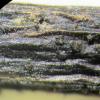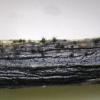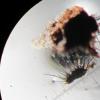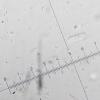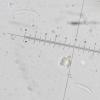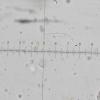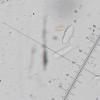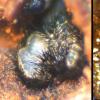
27-02-2026 17:51
 Michel Hairaud
Michel Hairaud
Bonjour, Quelqu'un peut il me donner un conseil p

28-02-2026 14:43
A new refrence desired :Svanidze, T.V. (1984) Novy

29-11-2024 21:47
Yanick BOULANGERBonjourJ'avais un deuxième échantillon moins mat

27-02-2026 16:17
 Mathias Hass
Mathias Hass
Hi, Found this on Betula, rather fresh fallen twi

27-02-2026 12:56
Åge OterhalsFound on fallen cones of Pinus sylvestris in midle

27-02-2026 11:21
 Yannick Mourgues
Yannick Mourgues
Hi to all. Here is a specie that can may be relat
'Sea-urchin' lookalike things on stem of populus leave
Ralph Vandiest,
29-05-2013 13:54
If found these small black things (0,2/0,25mm diam) with stiff hairs (up to 0,3mm) on dead stem of populus leave. I found 2 types of spores, no asci and don't know which spores belong to this species or what this species could be. Does anybody knows the genus or what this is?
Spores type 1: 'banana'-shaped 25x3µm
Spores type 2: 14/15x4µmwith 1 sept
regards,
ralph
Klaus Siepe,
29-05-2013 22:52
Re : 'Sea-urchin' lookalike things on stem of populus leave
Hi Ralph,
looks a bit like Pseudolachnea hispidula (Schrad.) B.Sutton, common on Urtica. But never found it on stems of leaves, conidia (Spores type 2) are a bit too wide and usually found with setulae.
Regards,
Klaus
looks a bit like Pseudolachnea hispidula (Schrad.) B.Sutton, common on Urtica. But never found it on stems of leaves, conidia (Spores type 2) are a bit too wide and usually found with setulae.
Regards,
Klaus
Martin Bemmann,
30-05-2013 19:46

Re : 'Sea-urchin' lookalike things on stem of populus leave
Hi Ralph,
Pseudolachnea h. was found on very different substrates. Just check the search function of this forum. In Ellis&Ellis (landplants) you will find it on p 299, fig 1321. But I would also expext apical setulae at the conidia. I did not see these shoe-shaped conidia in my find (on Robinia) as well.
Best regards
Martin
Pseudolachnea h. was found on very different substrates. Just check the search function of this forum. In Ellis&Ellis (landplants) you will find it on p 299, fig 1321. But I would also expext apical setulae at the conidia. I did not see these shoe-shaped conidia in my find (on Robinia) as well.
Best regards
Martin
Ralph Vandiest,
30-05-2013 20:24
Re : 'Sea-urchin' lookalike things on stem of populus leave
Hello Martin,
I have no experience at all with this genus but the 'banana' shaped spores measure around 25x3µm and I see no sept in the spores. With these measures I see in Ellis & Ellis Colletotrichum dematisum (p298, fig 1320) as a perfect match that grows on all kinds of dead stems. What do you think?
regards,
Ralph
I have no experience at all with this genus but the 'banana' shaped spores measure around 25x3µm and I see no sept in the spores. With these measures I see in Ellis & Ellis Colletotrichum dematisum (p298, fig 1320) as a perfect match that grows on all kinds of dead stems. What do you think?
regards,
Ralph
Martin Bemmann,
30-05-2013 21:00

Re : 'Sea-urchin' lookalike things on stem of populus leave
Hi Ralph,
I am far off to be experienced in Coelomycetes, but here are some data:
my find shows conidia with single setulae at both ends. The conidia measure (w/o conidia) 15-17.8 x 2-2.5 µm. This corresponds quite well with the measurements given by Sutton for Pseudolachnea hispidula: 15.5-18.5x2-3µm.
For Colletotrichium dematium he gives 19.5-24x2-2.5 (-3.5)µm and conidia without setulae.
Perhaps this is a better match for your find.
What I miss as well in your pictures is the typical aspect of Ps.h. with this pale-grey hymenium-like "disk".
Best regards
Martin
I am far off to be experienced in Coelomycetes, but here are some data:
my find shows conidia with single setulae at both ends. The conidia measure (w/o conidia) 15-17.8 x 2-2.5 µm. This corresponds quite well with the measurements given by Sutton for Pseudolachnea hispidula: 15.5-18.5x2-3µm.
For Colletotrichium dematium he gives 19.5-24x2-2.5 (-3.5)µm and conidia without setulae.
Perhaps this is a better match for your find.
What I miss as well in your pictures is the typical aspect of Ps.h. with this pale-grey hymenium-like "disk".
Best regards
Martin
